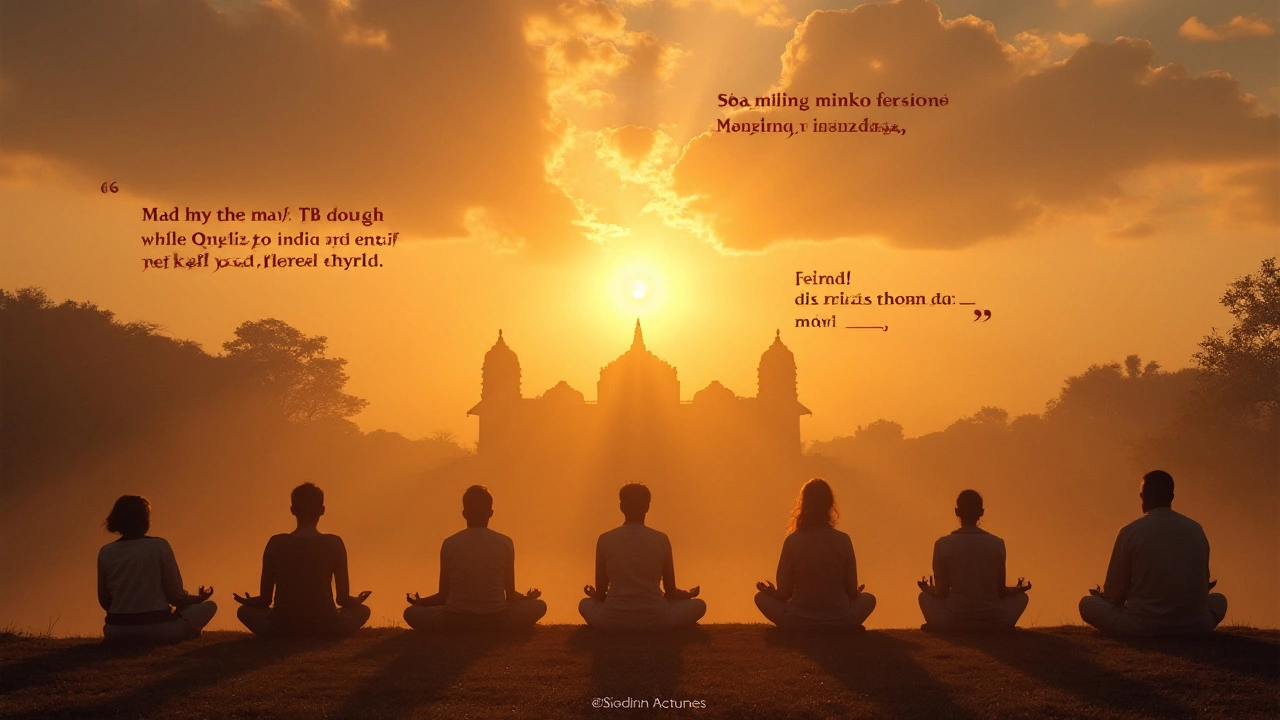Hinduism, one of the world's oldest religions, has a treasure trove of profound quotes that resonate with universal truths and values. These quotes, often extracted from revered texts like the Bhagavad Gita, Vedas, and Upanishads, encapsulate wisdom gathered over centuries.
These sayings are not just historical artefacts but continue to offer guidance and inspiration in our daily lives. From the spiritual teachings of detachment and duty to insights about life's purpose, Hindu quotes serve as a bridge between ancient philosophies and modern-day dilemmas.
Let us embark on a journey to explore these famous Hindu quotes, understand their deep meanings, and see how they can practically enrich our lives in today’s fast-paced world.
- Historical Context of Hindu Quotes
- Significant Quotes and Their Meanings
- Impact on Modern Society
- Applying Wisdom in Daily Life
Historical Context of Hindu Quotes
Hindu philosophy is a rich tapestry woven over millennia, with roots tracing back to the ancient Indus Valley civilization. The key sources of Hindu quotes are sacred texts, including the Vedas, Upanishads, and the epic poems such as the Mahabharata and Ramayana. These texts, written mostly in Sanskrit, serve as the bedrock of **Indian spirituality** and have been passed down through oral tradition initially, before being documented by sages.
The Vedas, among the oldest texts known to humanity dating back to around 1500-1200 BCE, are considered the foundational layers of spiritual and philosophical teachings. They encompass a broad spectrum of hymns, rituals, and meditations. As time progressed, the Upanishads emerged later, from 800-200 BCE, furthering the spiritual discourse by focusing on meditation, ethics, and metaphysical knowledge. They are famous for delving into concepts like Brahman (the ultimate reality) and Atman (the soul), often providing profound insights about the universe and the self.
The Bhagavad Gita, a 700-verse narrative housed within the Mahabharata, is set in a battlefield, which might seem contrary for a text about peace and duty. Yet, it symbolizes the internal conflict of choosing the right course in life. “You are what you believe in. You become that which you believe you can become,” one of its many teachings, profoundly influences **modern society** by emphasizing personal responsibility and self-awareness. Such quotes have, over centuries, inspired leaders and common folk alike.
“All the gods praise ‘OM’ as the highest; it was the first sound before, now and always. OM is the eternal truth, limitless and unattainable.”
These treasured expressions promote a life aligned with dharma (duty/ethics), artha (prosperity), kama (pleasures), and moksha (liberation), known as the Purusharthas. The emphasis on harmonizing these pursuits illustrates an advanced understanding of living a balanced and meaningful life, remaining relevant in today’s quest for a fulfilling existence. With their timeless appeal, these sayings offer guidance in an ever-evolving **modern society**, helping bridge the past and the present through a shared human experience.

Significant Quotes and Their Meanings
In the realm of Hindu philosophy, certain quotes have carved deep niches not only in Indian spirituality but across the globe. These quotes, simple yet profound, offer insights into human nature and the universe that remain remarkably relevant despite the passage of centuries. Among these, perhaps the most iconic comes from the Bhagavad Gita, where Lord Krishna counsels Arjuna with the timeless words, "Perform your duty, but do not concern yourself with the fruits of your actions". This teaches the importance of selfless action, emphasizing that one should focus on their prescribed duties without attachment to success or failure. The philosophy here is transformative in that it reduces anxiety about outcomes, urging individuals to immerse themselves in the present and in the sincerity of their efforts.
Another profound saying from the Upanishads is "Tat Tvam Asi," which translates to "Thou art that". It is a succinct expression of the identity of the self (Atman) with the absolute (Brahman). This quote encapsulates the Hindu belief in the interconnectedness of all beings and the divine essence pervading the universe. The realization of this unity liberates the individual from the confines of ego and selfish desire, fostering a sense of universal harmony. Not only does this shape individual consciousness, it also emphasizes the spiritual pursuit of self-realization as central to human existence.
Throughout Hindu texts, there are numerous inspirational sayings. Take, for instance, the statement "Ahimsa Paramo Dharma," meaning "non-violence is the highest duty." This principle has not only shaped the cultural and spiritual fabric of India but has also influenced leaders worldwide. Mahatma Gandhi, revered for his non-violent resistance, was profoundly inspired by this ethos. His application of non-violence served as a powerful tool for social and political change, demonstrating the practical wisdom encapsulated in Hindu quotes.
Let us also consider the Rig Veda’s instruction, "Aano Bhadrah Krathavo Yantu Vishwathah," imploring open-mindedness with "Let noble thoughts come to us from every side." This ancient verse exemplifies the inclusive and inquisitive nature of Indian spirituality, emphasizing the importance of intellectual openness and the acceptance of diverse perspectives. Such guidance encourages embracing knowledge and wisdom from various sources, fostering a world that is united in learning and shared understanding.
"The great secret of true success, of true happiness, is this: the man or woman who asks for no return, the perfectly unselfish person, is the most successful." – Swami VivekanandaEach of these sayings not only holds a deep meaning but also serves as a beacon, lighting the path for those navigating the tumultuous landscapes of life’s journey. Their timeless nature offers solace and guidance, urging society to strive towards higher ideals and deeper understanding. Whether through acts of selfless service, internal reflection, or the pursuit of knowledge, these teachings remain as pivotal today as they were in antiquity, shaping cultures and inspiring individuals worldwide.

Impact on Modern Society
Today, the profound wisdom of Hindu quotes continues to permeate modern society, influencing everything from personal growth practices to corporate ethics. In an era characterized by rapid change and unprecedented challenges, these ancient insights provide a steady guidepost. By touching upon universal themes such as duty, compassion, and self-awareness, they challenge individuals to pause and reflect amid the chaos of daily life. This influence is evident as a growing number of people turn to these sayings for guidance, transforming age-old teachings into practical life strategies.
The most striking aspect of this influence is perhaps seen in the realm of mental wellness. Concepts like detachment and mindfulness, rooted in Hindu thought, have found considerable ground within psychological practices worldwide. Take for instance the Bhagavad Gita's emphasis on 'Nishkama Karma' or selfless action, which resonates deeply within the workplace ethics discourse, promoting a culture of greater collaboration and empathy. The WHO acknowledges the growing mental health crisis, and here the applicability of these teachings shines, as they assist individuals in finding peace within.
Within the educational sector too, the integration of Indian spirituality is growing as educators incorporate these teachings into curricula aimed at holistic student development. Ancient scriptures emphasize the importance of inner knowledge, which coincides with modern educational paradigms focusing on emotional intelligence and ethical knowledge. This reflects a cyclical return to viewing education as not just academic but also a spiritual growth tool. Institutions increasingly champion mindfulness and meditation practices that are aligned with these spiritual insights.
Moreover, as the digital age transforms connectivity and communication, these quotes remain a powerful tool for inspiration across social media platforms. Influencers and thought leaders worldwide often share these sayings to promote positivity and resilience. A quote like, "The mind is everything. What you think you become" – attributed to Hindu philosophy – encapsulates this motivational trend, encouraging individuals to focus on positive thinking and self-improvement. Such an approach finds its place in motivational speeches and self-help literature globally.
The economic sphere hasn’t been left behind either. Entrepreneurs and business leaders are increasingly adopting values-driven models informed by Hindu philosophical tenets. Consider the concept of 'Dharma' or one's duty, which is increasingly echoed in the sustainability and corporate responsibility movements. By embracing these principles, businesses are not only seeking productivity but also fostering environments of ethical decision-making. In this way, Hindu quotes fundamentally transform approaches towards creating more humane, sustainable economic systems.
Finally, we find these sayings providing cultural bridges, as they transcend geographical boundaries to foster global understanding and peace. The teachings promote a sense of universal brotherhood, underscoring the interconnectedness vital for tackling global challenges like climate change and inequality. These timeless quotes offer more than philosophical musing; they serve as blueprints for cultivating harmony and unity amidst diversity.

Applying Wisdom in Daily Life
Incorporating the profound teachings of Hindu quotes into our daily routines can lead to a more balanced and fulfilling life. The wisdom found in these sayings often spans timeless concepts like duty, detachment, and inner peace. For instance, from the Bhagavad Gita comes the insightful teaching: "You have the right to work, but never to the fruit of work." This quote encourages us to focus on the process rather than the outcome, helping reduce stress and anxiety linked to result-oriented expectations. By embracing this perspective, individuals can approach tasks with greater mindfulness and dedication, fostering both personal and professional growth without getting bogged down by results.
Let's delve deeper. Consider the practice of detachment, known as ‘Vairagya.’ While in today's hyper-connected world, being too attached to results, possessions, or even relationships can lead to distress, the principle of detachment can be liberating. This doesn't mean indifference but rather a sense of calm assurance, where happiness is derived internally. A survey by the Global Wellness Institute points out that people who practice emotional detachment report a 60% decrease in stress levels. How about applying this in your morning routine? Start your day with a simple meditation on words like "Tat Tvam Asi" from the Upanishads, meaning "You are that"—an affirmation of the unity between you and the universe. Such practices can help ground your day in positivity and purpose.
"Be the change that you wish to see in the world." - Mahatma GandhiThis resonates strongly with Hindu teachings and emphasizes personal responsibility. Reflecting on it can inspire you to make small, meaningful changes. Start with a focus on truth—Satya. Being truthful can be as simple as staying honest with yourself about your needs and capabilities, which in turn encourages authentic self-expression. List out daily affirmations related to personal goals rooted in honesty, like maintaining integrity in challenging work situations. Highlight this with daily reminders on digital devices or even post-it notes. Such small yet impactful gestures can enhance personal integrity and foster a culture of trust and transparency around you.
How do we, then, integrate such wisdom with modern-day challenges? Begin with setting aside time for reflection and gratitude, a daily ritual supported by studies showing that gratitude practices can increase mental well-being by up to 30%. Create a gratitude journal, inspired by the spirit of Indian spirituality. Note down quotes or sayings that resonate with you each day and how they apply to your life circumstances that day. It's about finding the lesson in everyday moments and recording how your understanding of these principles evolves. Share these reflections in community groups or through personal blogs to amplify the learning process and create a shared sense of understanding.
